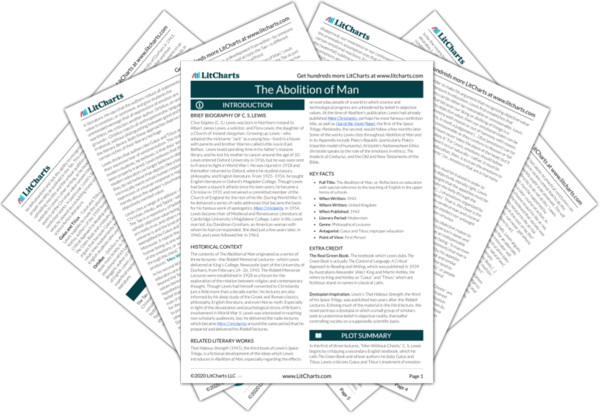Education, Emotional Sentiment, and Ethics
The Abolition of Man originated as a lecture series that C. S. Lewis delivered at the University of Durham in 1943, critiquing current methods of teaching English and their implications for broader society. He bases his argument on an English textbook he was asked to review, which he refers to as The Green Book, and he gives its authors the pseudonyms Gaius and Titius. Lewis staunchly attacks Gaius and Titius’s educational approach, because…
read analysis of Education, Emotional Sentiment, and EthicsObjective Value, Human Virtue, and Societal Health
After establishing the importance of rightly-formed emotional sentiment in modern education, Lewis develops his underlying principle of the Tao—a concept that must not be confused simply with Taoism, because it is “Platonic, Aristotelian, Stoic, Christian, and Oriental alike.” While these various worldviews might seem to defy generalization, Lewis contends that they have a very important principle in common: “It is the doctrine of objective value, the belief that certain attitudes are really true, and…
read analysis of Objective Value, Human Virtue, and Societal HealthTraditional Values vs. Innovation
After arguing for the existence of the “Tao,” or the objectivity of value and ethics, Lewis goes on, “Let us suppose that an Innovator in values regards dulce et decorum and greater love hath no man as mere irrational sentiments which are to be stripped off in order that we may get down to the ‘realistic’ or ‘basic’ ground of this value. Where will he find such a ground?” Here, Lewis cites two…
read analysis of Traditional Values vs. Innovation
Nature, Science, and the Abolition of Man
In his final lecture, Lewis finally arrives at the idea of “the abolition of man.” So far, he has argued for the indispensability of reason-based sentiments in education, the continued validity of objective value, and the emptiness of innovations that are not grounded on traditional principles. Now, in his climactic lecture, he builds on these ideas by describing modern science as an attempt to conquer nature and thereby to mold humanity to the conquerors’ liking…
read analysis of Nature, Science, and the Abolition of Man






